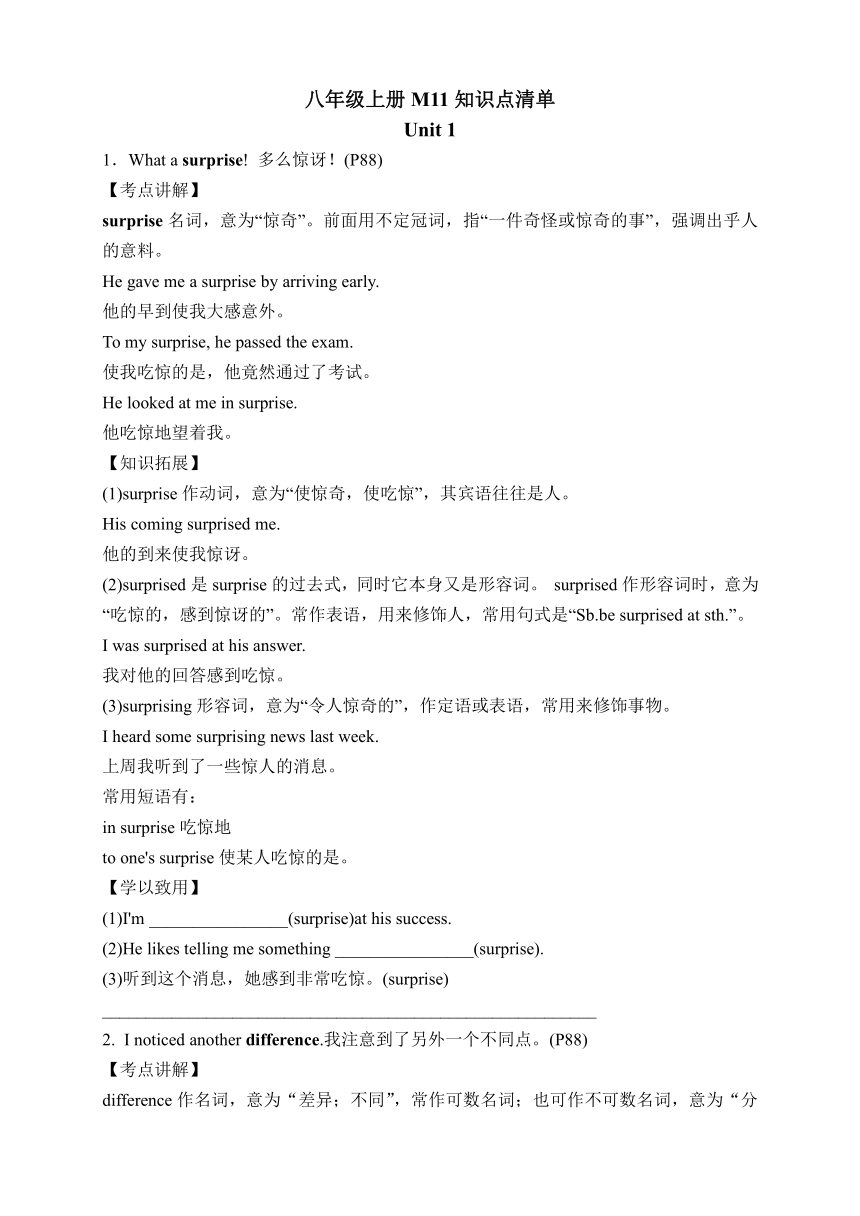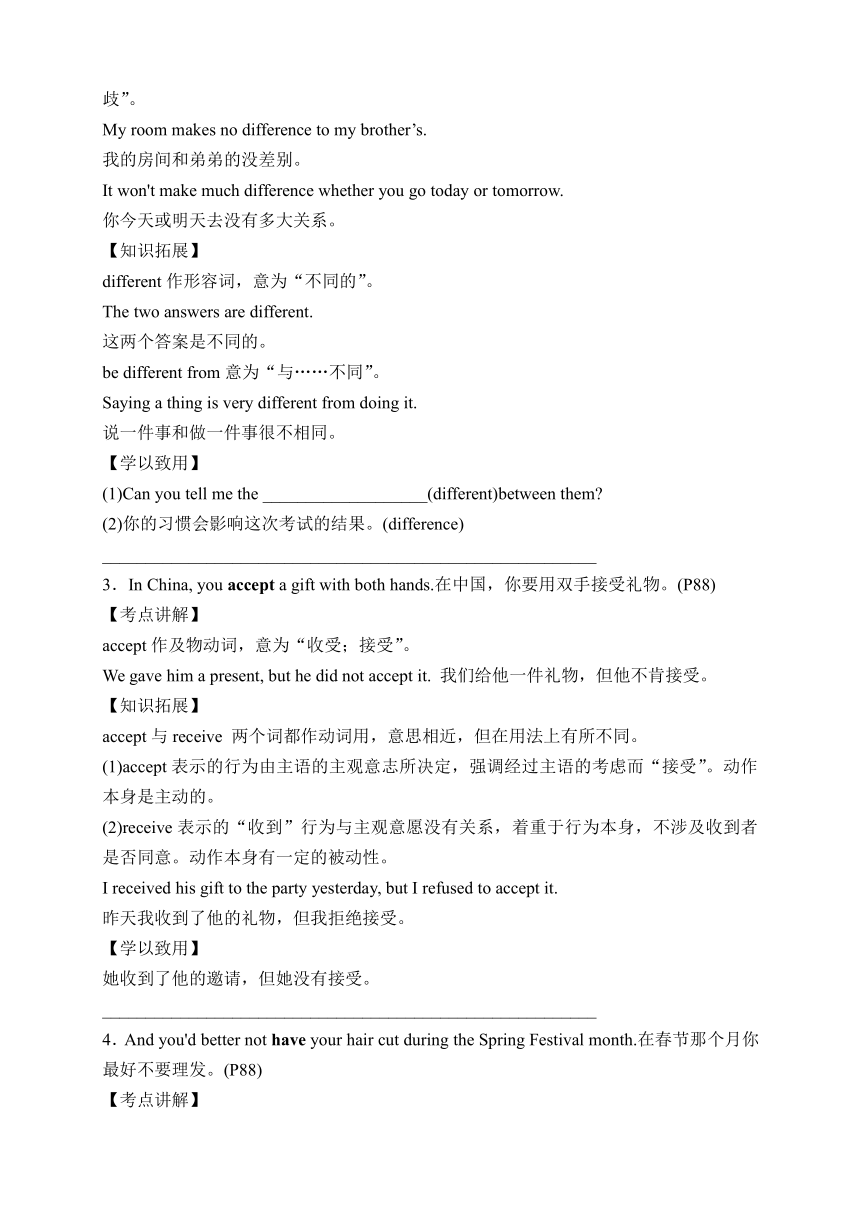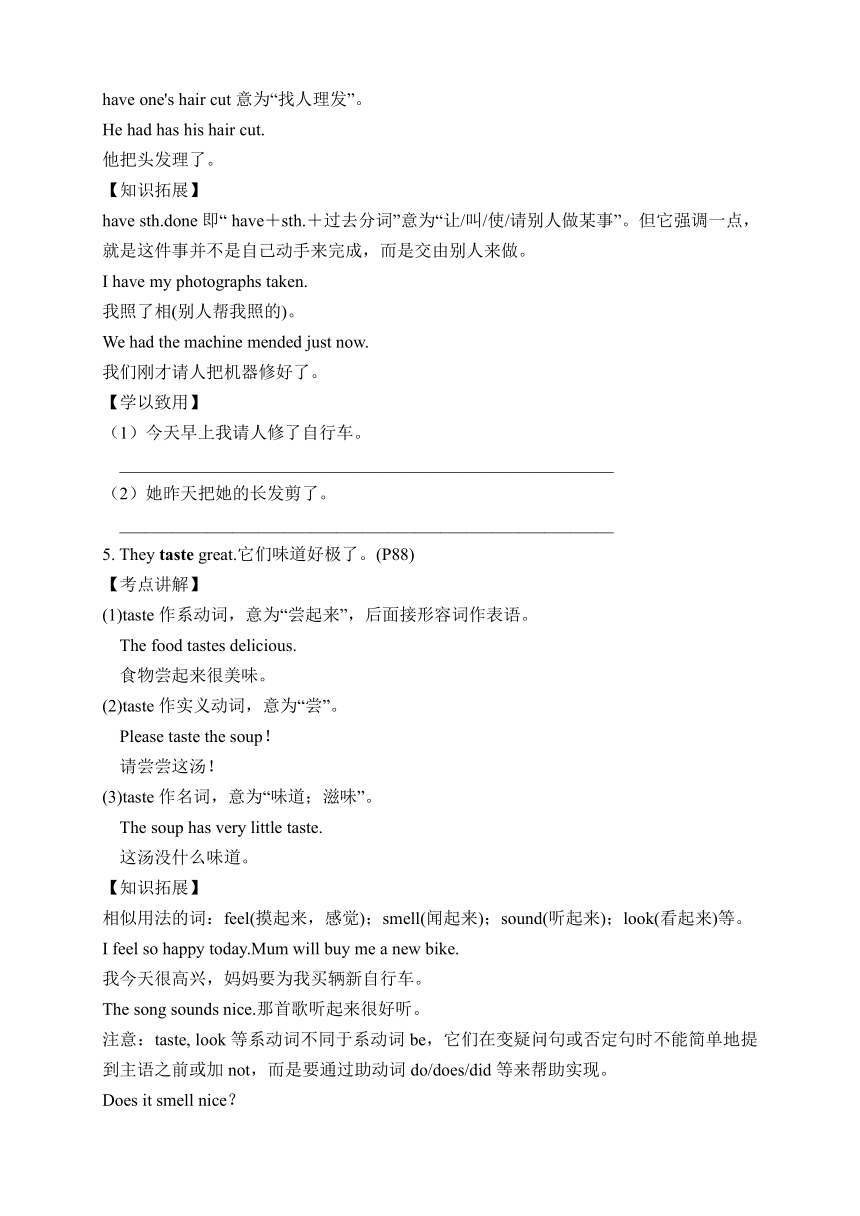Module 11 Way of life知识清单外研版八年级英语上册
文档属性
| 名称 | Module 11 Way of life知识清单外研版八年级英语上册 |

|
|
| 格式 | docx | ||
| 文件大小 | 23.4KB | ||
| 资源类型 | 教案 | ||
| 版本资源 | 外研版 | ||
| 科目 | 英语 | ||
| 更新时间 | 2024-01-15 00:00:00 | ||
图片预览



文档简介
八年级上册M11知识点清单
Unit 1
1.What a surprise! 多么惊讶!(P88)
【考点讲解】
surprise名词,意为“惊奇”。前面用不定冠词,指“一件奇怪或惊奇的事”,强调出乎人的意料。
He gave me a surprise by arriving early.
他的早到使我大感意外。
To my surprise, he passed the exam.
使我吃惊的是,他竟然通过了考试。
He looked at me in surprise.
他吃惊地望着我。
【知识拓展】
(1)surprise作动词,意为“使惊奇,使吃惊”,其宾语往往是人。
His coming surprised me.
他的到来使我惊讶。
(2)surprised是surprise的过去式,同时它本身又是形容词。 surprised作形容词时,意为“吃惊的,感到惊讶的”。常作表语,用来修饰人,常用句式是“Sb.be surprised at sth.”。
I was surprised at his answer.
我对他的回答感到吃惊。
(3)surprising形容词,意为“令人惊奇的”,作定语或表语,常用来修饰事物。
I heard some surprising news last week.
上周我听到了一些惊人的消息。
常用短语有:
in surprise吃惊地
to one's surprise使某人吃惊的是。
【学以致用】
(1)I'm ________________(surprise)at his success.
(2)He likes telling me something ________________(surprise).
(3)听到这个消息,她感到非常吃惊。(surprise)
_________________________________________________________
I noticed another difference.我注意到了另外一个不同点。(P88)
【考点讲解】
difference作名词,意为“差异;不同”,常作可数名词;也可作不可数名词,意为“分歧”。
My room makes no difference to my brother’s.
我的房间和弟弟的没差别。
It won't make much difference whether you go today or tomorrow.
你今天或明天去没有多大关系。
【知识拓展】
different作形容词,意为“不同的”。
The two answers are different.
这两个答案是不同的。
be different from意为“与……不同”。
Saying a thing is very different from doing it.
说一件事和做一件事很不相同。
【学以致用】
(1)Can you tell me the ___________________(different)between them
(2)你的习惯会影响这次考试的结果。(difference)
_________________________________________________________
3.In China, you accept a gift with both hands.在中国,你要用双手接受礼物。(P88)
【考点讲解】
accept作及物动词,意为“收受;接受”。
We gave him a present, but he did not accept it. 我们给他一件礼物,但他不肯接受。
【知识拓展】
accept与receive 两个词都作动词用,意思相近,但在用法上有所不同。
(1)accept表示的行为由主语的主观意志所决定,强调经过主语的考虑而“接受”。动作本身是主动的。
(2)receive表示的“收到”行为与主观意愿没有关系,着重于行为本身,不涉及收到者是否同意。动作本身有一定的被动性。
I received his gift to the party yesterday, but I refused to accept it.
昨天我收到了他的礼物,但我拒绝接受。
【学以致用】
她收到了他的邀请,但她没有接受。
_________________________________________________________
4.And you'd better not have your hair cut during the Spring Festival month.在春节那个月你最好不要理发。(P88)
【考点讲解】
have one's hair cut意为“找人理发”。
He had has his hair cut.
他把头发理了。
【知识拓展】
have sth.done即“ have+sth.+过去分词”意为“让/叫/使/请别人做某事”。但它强调一点,就是这件事并不是自己动手来完成,而是交由别人来做。
I have my photographs taken.
我照了相(别人帮我照的)。
We had the machine mended just now.
我们刚才请人把机器修好了。
【学以致用】
(1)今天早上我请人修了自行车。
_________________________________________________________
(2)她昨天把她的长发剪了。
_________________________________________________________
5. They taste great.它们味道好极了。(P88)
【考点讲解】
(1)taste作系动词,意为“尝起来”,后面接形容词作表语。
The food tastes delicious.
食物尝起来很美味。
(2)taste作实义动词,意为“尝”。
Please taste the soup!
请尝尝这汤!
(3)taste作名词,意为“味道;滋味”。
The soup has very little taste.
这汤没什么味道。
【知识拓展】
相似用法的词:feel(摸起来,感觉);smell(闻起来);sound(听起来);look(看起来)等。
I feel so happy today.Mum will buy me a new bike.
我今天很高兴,妈妈要为我买辆新自行车。
The song sounds nice.那首歌听起来很好听。
注意:taste, look等系动词不同于系动词be,它们在变疑问句或否定句时不能简单地提到主语之前或加not,而是要通过助动词do/does/did等来帮助实现。
Does it smell nice?
它闻起来很好吗?
The chicken doesn't taste good.
鸡肉尝起来不好。
How do the children look?
孩子们看起来怎么样?
【学以致用】
(1)这个生日蛋糕很好吃。(taste)
______________________________________________________________
(2)那件裙子看上去很漂亮。(look)
______________________________________________________________
Unit 2
1.My experiences in England 我在英国的经历(P90)
【考点讲解】
experience此处用作可数名词,意为“经历(的事)”。
Did he tell you about his experience as a driver
他告诉你他当司机的那段经历了吗?
【知识拓展】
(1)experience还可用作不可数名词,意为“经验;体验”。
She is a Chinese teacher with 30 years' teaching experience.
她是一位具有30年教学经验的语文老师。
(2)experience还可用作动词,意为“体验,感受,经历,体会,遭受,经受”
Today I'm going to experience skiing. 今天我要体验一下滑雪。
【学以致用】
(1)She said she would never forget some pleasant ________________(experience)while working there.
(2)请跟我们谈谈你在非洲的经历。
_______________________________________________________________
(3)他是一个经验丰富的人。
______________________________________________________________
(4)你将会经历一次不一样的旅行。
______________________________________________________________
2.When you get to know each other better or when they ask you to, you can just use their first names.当你们更好地相互了解,或他们让你这么做时,你可以只叫他们的名字。(P90)
【考点讲解】
each other意为“互相;各自”。
Both girls write to each other regularly now.
两位女孩频频互通书信。
【知识拓展】
any other是指在同一范围内除了某人或某物以外的其他人或事物,any other后跟单数名词,也可以说any of the other+复数名词。
Tom runs faster than any other student(或any of the other students)in his class.
汤姆比他班上的任何其他人都跑得快。
New York is larger than any other city in the US.
纽约比美国的任何一个其他城市都大。
【学以致用】
(1)Betty和她妹妹很小就学会互相照顾。(each other)
_______________________________________________________________
(2)上海比中国的任何一个其他城市都繁忙。(any other)
_______________________________________________________________
3.Afternoon tea is not just a drink but a light meal at around 4 pm.下午茶不仅仅是喝茶,而且是下午四点左右的一顿便餐。(P90)
【考点讲解】
not just...but...意为“不仅仅……而且……”,相当于not only...but also...。not only...but also...的变形有:not only...but...;not only...but...as well等。
He is not just a doctor but a very good friend of ours.
他不仅是名医生,还是我们的好朋友。
Franklin was considered not only an inventor, but also a statesman.
富兰克林不仅被看作发明家,而且被看作政治家。
【知识拓展】
当not just...but.../not only...but also连接两个并列主语时,谓语应同靠近的主语在人称和数上取得一致。
Not just you but he likes the country music very much.
不但你,而且他也很喜欢乡村音乐。
Not only the boy, but also his parents like seeing films.
不仅那个男孩,而且他的父母都喜欢看电影。
【学以致用】
(1)他不仅会卖衣服而且做衣服。(not just...but)
______________________________________________________________
(2)我不仅喜欢唱歌,而且喜欢跳舞。(not only...but also...)
______________________________________________________________
4.Once I noticed a gentleman touch a young man on the shoulder...有一次,我注意到一位绅士碰了碰一个年轻人的肩膀……(P90)
【考点讲解】
touch sb.on the shoulder意为“拍某人的肩膀”
My brother touches me on the shoulder and runs away.
我的弟弟轻拍了一下我的肩膀就跑开了。
【知识拓展】
(1)touch sb.+on+the+身体比较突出、坚硬的地方,比如nose(鼻子),shoulder(肩膀)等等,指的是触碰某个部位。
Mr Wang touched his son on the head.
王先生摸摸儿子的头。
(2)touch sb.+by+the+身体某个部位,是指“用……触摸”,比如用fingers(手指)等等。
He touched his brother by the arm.
他用胳膊碰了碰他弟弟。
(3)touch sb.+in+the+身体比较柔软的地方,比如cheek(脸颊)等,也指触摸某个部位。
She touched her daughter in the cheek lightly.
她轻轻地摸了摸女儿的脸颊。
【学以致用】
她感觉到有人碰了一下我的肩膀。(touch)
______________________________________________________________
Unit 1
1.What a surprise! 多么惊讶!(P88)
【考点讲解】
surprise名词,意为“惊奇”。前面用不定冠词,指“一件奇怪或惊奇的事”,强调出乎人的意料。
He gave me a surprise by arriving early.
他的早到使我大感意外。
To my surprise, he passed the exam.
使我吃惊的是,他竟然通过了考试。
He looked at me in surprise.
他吃惊地望着我。
【知识拓展】
(1)surprise作动词,意为“使惊奇,使吃惊”,其宾语往往是人。
His coming surprised me.
他的到来使我惊讶。
(2)surprised是surprise的过去式,同时它本身又是形容词。 surprised作形容词时,意为“吃惊的,感到惊讶的”。常作表语,用来修饰人,常用句式是“Sb.be surprised at sth.”。
I was surprised at his answer.
我对他的回答感到吃惊。
(3)surprising形容词,意为“令人惊奇的”,作定语或表语,常用来修饰事物。
I heard some surprising news last week.
上周我听到了一些惊人的消息。
常用短语有:
in surprise吃惊地
to one's surprise使某人吃惊的是。
【学以致用】
(1)I'm ________________(surprise)at his success.
(2)He likes telling me something ________________(surprise).
(3)听到这个消息,她感到非常吃惊。(surprise)
_________________________________________________________
I noticed another difference.我注意到了另外一个不同点。(P88)
【考点讲解】
difference作名词,意为“差异;不同”,常作可数名词;也可作不可数名词,意为“分歧”。
My room makes no difference to my brother’s.
我的房间和弟弟的没差别。
It won't make much difference whether you go today or tomorrow.
你今天或明天去没有多大关系。
【知识拓展】
different作形容词,意为“不同的”。
The two answers are different.
这两个答案是不同的。
be different from意为“与……不同”。
Saying a thing is very different from doing it.
说一件事和做一件事很不相同。
【学以致用】
(1)Can you tell me the ___________________(different)between them
(2)你的习惯会影响这次考试的结果。(difference)
_________________________________________________________
3.In China, you accept a gift with both hands.在中国,你要用双手接受礼物。(P88)
【考点讲解】
accept作及物动词,意为“收受;接受”。
We gave him a present, but he did not accept it. 我们给他一件礼物,但他不肯接受。
【知识拓展】
accept与receive 两个词都作动词用,意思相近,但在用法上有所不同。
(1)accept表示的行为由主语的主观意志所决定,强调经过主语的考虑而“接受”。动作本身是主动的。
(2)receive表示的“收到”行为与主观意愿没有关系,着重于行为本身,不涉及收到者是否同意。动作本身有一定的被动性。
I received his gift to the party yesterday, but I refused to accept it.
昨天我收到了他的礼物,但我拒绝接受。
【学以致用】
她收到了他的邀请,但她没有接受。
_________________________________________________________
4.And you'd better not have your hair cut during the Spring Festival month.在春节那个月你最好不要理发。(P88)
【考点讲解】
have one's hair cut意为“找人理发”。
He had has his hair cut.
他把头发理了。
【知识拓展】
have sth.done即“ have+sth.+过去分词”意为“让/叫/使/请别人做某事”。但它强调一点,就是这件事并不是自己动手来完成,而是交由别人来做。
I have my photographs taken.
我照了相(别人帮我照的)。
We had the machine mended just now.
我们刚才请人把机器修好了。
【学以致用】
(1)今天早上我请人修了自行车。
_________________________________________________________
(2)她昨天把她的长发剪了。
_________________________________________________________
5. They taste great.它们味道好极了。(P88)
【考点讲解】
(1)taste作系动词,意为“尝起来”,后面接形容词作表语。
The food tastes delicious.
食物尝起来很美味。
(2)taste作实义动词,意为“尝”。
Please taste the soup!
请尝尝这汤!
(3)taste作名词,意为“味道;滋味”。
The soup has very little taste.
这汤没什么味道。
【知识拓展】
相似用法的词:feel(摸起来,感觉);smell(闻起来);sound(听起来);look(看起来)等。
I feel so happy today.Mum will buy me a new bike.
我今天很高兴,妈妈要为我买辆新自行车。
The song sounds nice.那首歌听起来很好听。
注意:taste, look等系动词不同于系动词be,它们在变疑问句或否定句时不能简单地提到主语之前或加not,而是要通过助动词do/does/did等来帮助实现。
Does it smell nice?
它闻起来很好吗?
The chicken doesn't taste good.
鸡肉尝起来不好。
How do the children look?
孩子们看起来怎么样?
【学以致用】
(1)这个生日蛋糕很好吃。(taste)
______________________________________________________________
(2)那件裙子看上去很漂亮。(look)
______________________________________________________________
Unit 2
1.My experiences in England 我在英国的经历(P90)
【考点讲解】
experience此处用作可数名词,意为“经历(的事)”。
Did he tell you about his experience as a driver
他告诉你他当司机的那段经历了吗?
【知识拓展】
(1)experience还可用作不可数名词,意为“经验;体验”。
She is a Chinese teacher with 30 years' teaching experience.
她是一位具有30年教学经验的语文老师。
(2)experience还可用作动词,意为“体验,感受,经历,体会,遭受,经受”
Today I'm going to experience skiing. 今天我要体验一下滑雪。
【学以致用】
(1)She said she would never forget some pleasant ________________(experience)while working there.
(2)请跟我们谈谈你在非洲的经历。
_______________________________________________________________
(3)他是一个经验丰富的人。
______________________________________________________________
(4)你将会经历一次不一样的旅行。
______________________________________________________________
2.When you get to know each other better or when they ask you to, you can just use their first names.当你们更好地相互了解,或他们让你这么做时,你可以只叫他们的名字。(P90)
【考点讲解】
each other意为“互相;各自”。
Both girls write to each other regularly now.
两位女孩频频互通书信。
【知识拓展】
any other是指在同一范围内除了某人或某物以外的其他人或事物,any other后跟单数名词,也可以说any of the other+复数名词。
Tom runs faster than any other student(或any of the other students)in his class.
汤姆比他班上的任何其他人都跑得快。
New York is larger than any other city in the US.
纽约比美国的任何一个其他城市都大。
【学以致用】
(1)Betty和她妹妹很小就学会互相照顾。(each other)
_______________________________________________________________
(2)上海比中国的任何一个其他城市都繁忙。(any other)
_______________________________________________________________
3.Afternoon tea is not just a drink but a light meal at around 4 pm.下午茶不仅仅是喝茶,而且是下午四点左右的一顿便餐。(P90)
【考点讲解】
not just...but...意为“不仅仅……而且……”,相当于not only...but also...。not only...but also...的变形有:not only...but...;not only...but...as well等。
He is not just a doctor but a very good friend of ours.
他不仅是名医生,还是我们的好朋友。
Franklin was considered not only an inventor, but also a statesman.
富兰克林不仅被看作发明家,而且被看作政治家。
【知识拓展】
当not just...but.../not only...but also连接两个并列主语时,谓语应同靠近的主语在人称和数上取得一致。
Not just you but he likes the country music very much.
不但你,而且他也很喜欢乡村音乐。
Not only the boy, but also his parents like seeing films.
不仅那个男孩,而且他的父母都喜欢看电影。
【学以致用】
(1)他不仅会卖衣服而且做衣服。(not just...but)
______________________________________________________________
(2)我不仅喜欢唱歌,而且喜欢跳舞。(not only...but also...)
______________________________________________________________
4.Once I noticed a gentleman touch a young man on the shoulder...有一次,我注意到一位绅士碰了碰一个年轻人的肩膀……(P90)
【考点讲解】
touch sb.on the shoulder意为“拍某人的肩膀”
My brother touches me on the shoulder and runs away.
我的弟弟轻拍了一下我的肩膀就跑开了。
【知识拓展】
(1)touch sb.+on+the+身体比较突出、坚硬的地方,比如nose(鼻子),shoulder(肩膀)等等,指的是触碰某个部位。
Mr Wang touched his son on the head.
王先生摸摸儿子的头。
(2)touch sb.+by+the+身体某个部位,是指“用……触摸”,比如用fingers(手指)等等。
He touched his brother by the arm.
他用胳膊碰了碰他弟弟。
(3)touch sb.+in+the+身体比较柔软的地方,比如cheek(脸颊)等,也指触摸某个部位。
She touched her daughter in the cheek lightly.
她轻轻地摸了摸女儿的脸颊。
【学以致用】
她感觉到有人碰了一下我的肩膀。(touch)
______________________________________________________________
同课章节目录
- Module 1 How to learn English
- Unit 1 Let's try to speak English as much as possi
- Unit 2 You should smile at her.
- Unit 3 Language in use .
- Module 2 My home town and my country
- Unit 1 It's taller than many other buildings.
- Unit 2 Cambridge is a beautiful city in the east o
- Unit 3 Language in use .
- Module 3 Sports.
- Unit 1 Nothing is more exciting than playing tenni
- Unit 2 This year we training more carefully.
- Unit 3 Language in use .
- Module 4 Planes, ships and trains .
- Unit 1 He lives the farthest from school.
- Unit 2 What is the best way to travel.
- Unit 3 Language in use .
- Module 5 Lao She Teahouse.
- Unit 1 I wanted to see the Beijing Opera.
- Unit 2 It descibes the changes in Chinese society.
- Unit 3 Language in use .
- Module 6 Animals in danger.
- Unit 1 It allows people to get closer to them .
- Unit 2 The WWF is working hard to save them all.
- Unit 3 Language in use .
- Revision module A
- Module 7 A famous story
- Unit 1 Alice was sitting with her sister by the ri
- Unit 2 She was thinking about her cat.
- Unit 3 Language in use .
- Module 8 Accidents
- Unit 1 While the car were changing to red, a car s
- Unit 2 I was trying to pick it up when it bite me
- Unit 3 Language in use .
- Module 9 Population
- Unit 1 The population of China is about 1.37 billi
- Unit 2 Arnwick was a city with 200,000 people.
- Unit 3 Language in use .
- Module 10 The weathe
- Unit 1 It might snow.
- Unit 2 The weather is fine all year round.
- Unit 3 Language in use .
- Module 11 Way of life
- Unit 1 In China ,we open a gift later.
- Unit 2 In England, you usually drink tea with milk
- Unit 3 Language in use .
- Module 12 Help
- Unit 1 What should we do before help arrives?
- Unit 2 Stay away from windows and heavy furniture.
- Unit 3 Language in use .
- Revision module B
